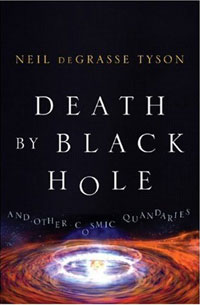|
|
Review: Death by Black Hole
by Jeff Foust
Monday, May 21, 2007
Death by Black Hole: And Other Cosmic Quandries
by Neil deGrasse Tyson
W. W. Norton and Company, 2007
hardcover, 384 pp.
ISBN 0-393-06224-4
US$24.95/C$31
If anyone can claim the title of astronomy’s Great Communicator since the death of Carl Sagan over a decade ago, it’s Neil deGrasse Tyson (see “Where have you gone, Joe DiMaggio?”, The Space Review, July 26, 2004). As director of the Hayden Planetarium in New York City, Tyson has used a variety of methods to engage with and inform the public, from his museum’s exhibits to speeches and television appearances to books and essays. While he has not achieved the same level of public recognition as Sagan did—perhaps because the media environment today is more fractured than it was a quarter-century ago in Sagan’s heyday—Tyson has demonstrated his ability to both entertain and inform, be it jousting with Jon Stewart on The Daily Show (the contemporary equivalent of Sagan’s appearances on The Tonight Show) or his after-dinner speech last month at the National Space Symposium, which had the normally staid corporate and government audience rolling in the aisles with laughter as he gently—but accurately—lampooned aspects of the aerospace industry. In Death by Black Hole, he takes the reader on a tour of the universe, one essay at a time.
| In each essay, Tyson uses history, science, personal experience, and more to effectively communicate principles of astronomy in a manner easily understood, and enjoyed, by the layman. |
Death by Black Hole is a collection of essays that Tyson has written for Natural History magazine since the mid-1990s. These essays deal primarily, but not exclusively, with various aspects of astronomy, from the solar system to astrobiology to the title essay (which, as the name suggests, describes what would happen if you were unfortunate enough to stray too close to a black hole.) A handful of essays towards the end of the book deal with the intersection of science with both religion and culture, such as how Hollywood frequently gets the basics of astronomy wrong in movies. In each essay, Tyson uses history, science, personal experience, and more to effectively communicate principles of astronomy in a manner easily understood, and enjoyed, by the layman.
If there is a weakness to Death by Black Hole, it’s that it is a collection of essays rather than a single unified book. While the 42 essays in the book are grouped together in seven sections, there’s little flow from one to the next: each stands on its own, as it did when it appeared in the pages of Natural History. Therefore, there’s no central theme or message that the book builds up, other than, perhaps, that while aspects of the universe may be mysterious to us today, it is not inherently incomprehensible. That is, though, a pretty fundamental message, and there are few people today able to communicate it as effectively as Tyson.
Jeff Foust (jeff@thespacereview.com) is the editor and publisher of The Space Review. He also operates the Spacetoday.net web site and the Space Politics and Personal Spaceflight weblogs. Views and opinions expressed in this article are those of the author alone, and do not represent the official positions of any organization or company, including the Futron Corporation, the author’s employer.
|
|
